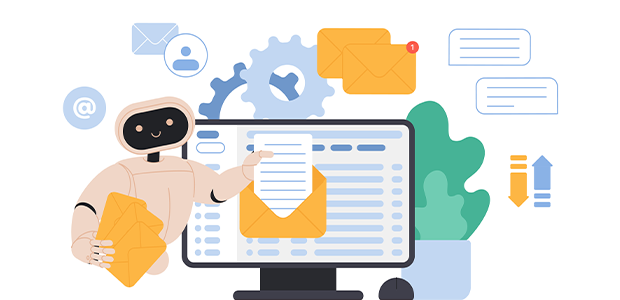
AI won’t take your marketing job – but it will change how you do it
AI won’t take your job. It will change your job. Here’s how to handle that.
If you’re running a startup, you’ve probably heard the hype: AI will take your job. Headlines talk about layoffs and how ChatGPT can replace people. It can feel like your marketer is one prompt away from being redundant.
But the truth is simpler: AI won’t kill marketing jobs. It will kill bad marketing.
Used well, AI gives startups a big advantage. It helps small teams move faster and save money. Used poorly, it produces generic, confusing content that damages your brand.
I’ve seen both. I’ve worked with global marketing teams during rebrands, expansions, pivots, and fast growth. Good marketers use new tools to get better. Others fall behind when they resist change. The difference is not the technology – it’s how you use it.
This isn’t just my opinion. According to McKinsey’s State of AI in 2025 Report, a third of organisations now use generative AI regularly in at least one business function – with marketing and sales among the top three areas of adoption.
But there’s a risk. Less than half of companies are actively managing AI risks. That leaves them open to quality, security, and reputation problems. Over 40% expect to reskill at least a fifth of their workforce to adapt to these tools. AI won’t replace strategy – it will change how you do it.
Routine work like writing emails, analysing customer data, and creating images will get quicker. But strategy, brand voice, cultural nuance, and customer trust still need human judgment.
Gartner predicts that by the end of 2025, 30% of all outbound marketing from large companies will be AI-generated. That’s not necessarily bad – but it means there will be more content than ever. If you’re not careful, your message will get lost in a sea of generic noise.
The reality: startups already use AI
Here’s something we tell founders all the time: you’re already using AI, even if you don’t call it that.
- Email platforms suggesting subject lines
- Google Analytics 4 recommending audiences
- Chatbots handling FAQs
You’re not alone. Salesforce’s State of Marketing 2025 Report found that 71% of startups now describe AI as “critical” or “very important” to their marketing stack - up from just 55% in 2023.
If you’re a founder, the question isn’t if you’re using AI. It’s how deliberately you’re using it.
Mistake #1: expecting AI to “do marketing for you”
This is one of the most common traps for busy startups. It’s easy to just type “write me a marketing plan” into ChatGPT, publish AI copy without editing, or trust ad platform suggestions blindly. But that can lead to off-brand messages that don’t connect. Use AI to draft ideas, but take time to refine them. Treat it like a junior copywriter – it’s fast, but needs your team’s editing. Recommendation: include AI training in your onboarding.
Mistake #2: trying to save money instead of building skills
It’s easy to think AI can replace experience: “we’ll just hire someone junior because AI will do the hard stuff.” But AI doesn’t replace strategy – it augments junior talent.
For example, a junior marketer could use ChatGPT to whip up ten social posts in minutes. But you still need an experienced marketer to pick the strongest ones and make sure they fit your brand voice and goals.
A tip for founders: don’t just invest in tools – invest in training your team to use them well.
Worth noting: 74% of marketers say prompt quality is now the top success factor in using AI effectively based on The HubSpot Blog’s AI Trends for Marketers Report 2025.
Mistake #3: losing your brand’s voice
One big risk with AI is that it can make your brand sound just like everyone else. AI-generated copy often reads as safe, bland, and generic – and customers notice.
A good test? Paste your last AI-generated post next to a competitor’s. If everything sounds the same, that’s a problem. Fix it by setting clear brand guidelines for your tone, key words, and things to avoid. AI works best with clear, specific instructions.
How to use AI well in a startup marketing team
Used thoughtfully, AI can save your team hours and free them up for real strategy.
Practical uses:
- Brainstorm campaign angles quickly
- Draft social posts, then edit for brand voice
- Generate customer personas from your CRM
- Analyse reviews to find trends
- Speed up SEO research
Recommended tools:
- ChatGPT or Claude for copy drafts
- MidJourney or DALL-E for visuals
- Jasper or Copy.ai for social posts
- Google Performance Max (but tune exclusions carefully)
Building an AI-ready marketing team
If you’re a founder, talk to your marketing team about how they’re using AI. Good questions for your next 1:1:
- How are we using AI today?
- Where is it saving time?
- Where does it risk hurting quality?
- What training do we need?
Also, recognise that prompt engineering is now an essential skill. Writing clear, brand-safe prompts is part of the job. Even small teams should invest in training here.
The bottom line
Great startups won’t replace marketing teams with AI. They’ll train them to use it well. That’s your real competitive advantage.
For more startup news, check out the other articles on the website, and subscribe to the magazine for free. Listen to The Cereal Entrepreneur podcast for more interviews with entrepreneurs and big-hitters in the startup ecosystem.

